Unit 12 What did you do last weekend? 单元综合复习课件 人教版英语七年级下册
文档属性
| 名称 | Unit 12 What did you do last weekend? 单元综合复习课件 人教版英语七年级下册 |  | |
| 格式 | pptx | ||
| 文件大小 | 32.4MB | ||
| 资源类型 | 试卷 | ||
| 版本资源 | 人教新目标(Go for it)版 | ||
| 科目 | 英语 | ||
| 更新时间 | 2024-05-31 19:22:38 | ||
图片预览

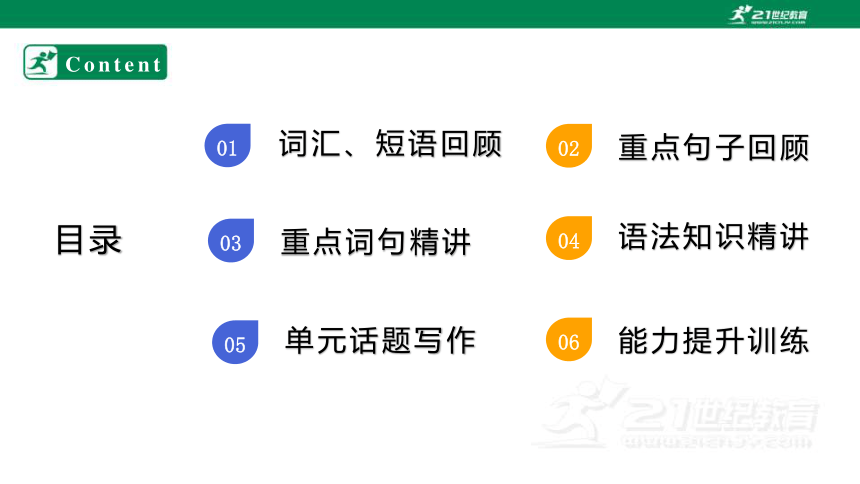

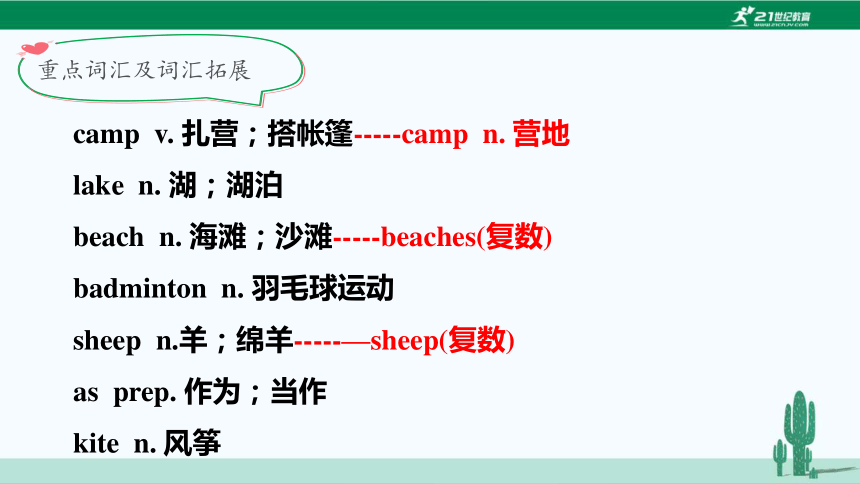
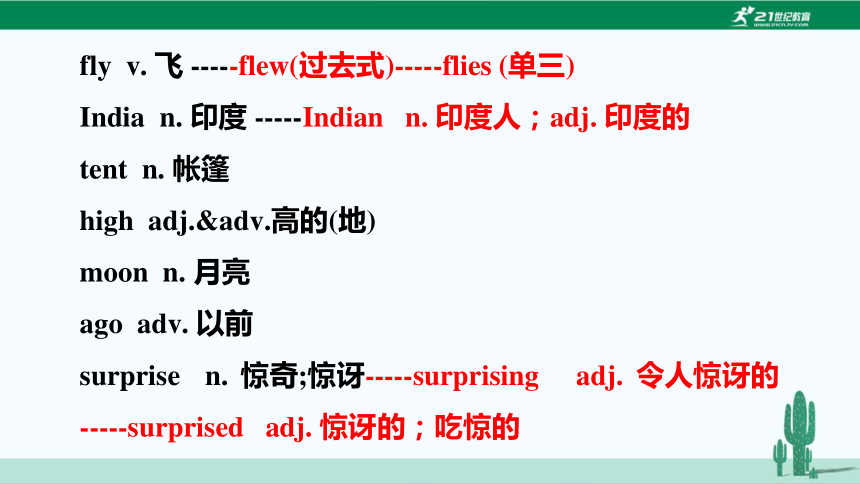
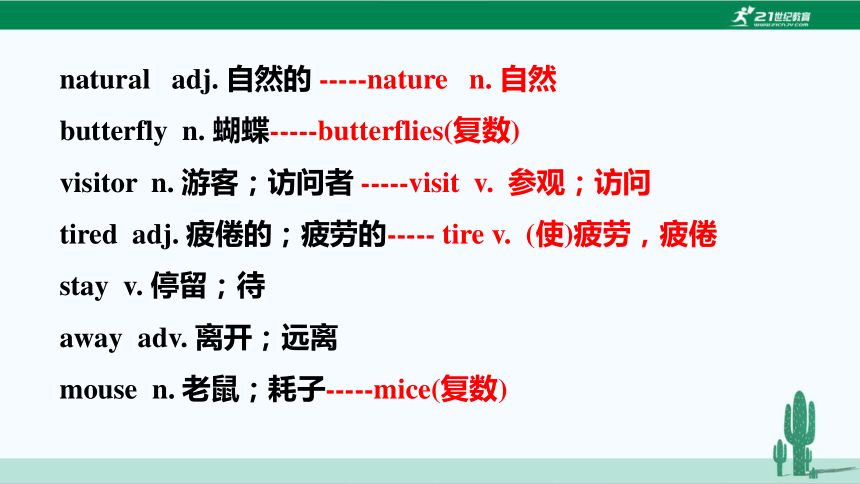

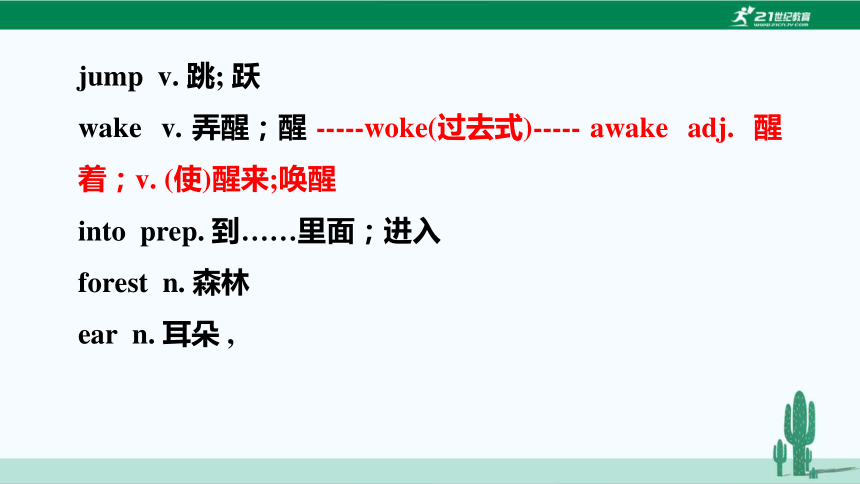
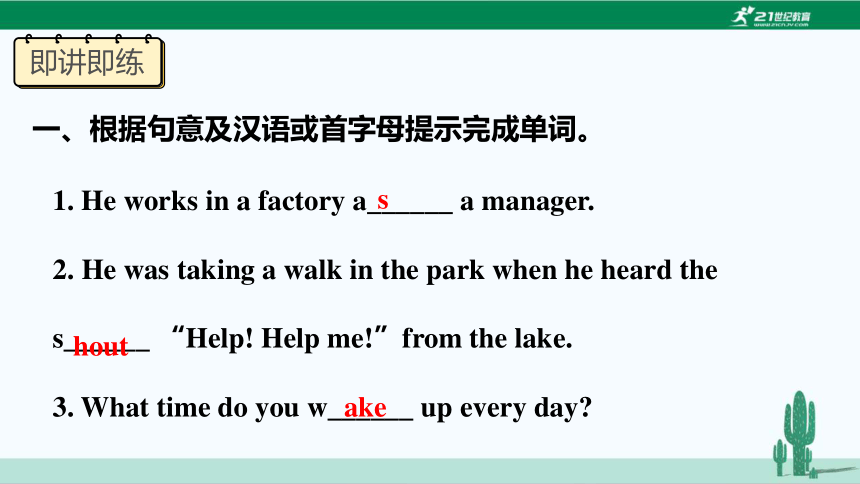
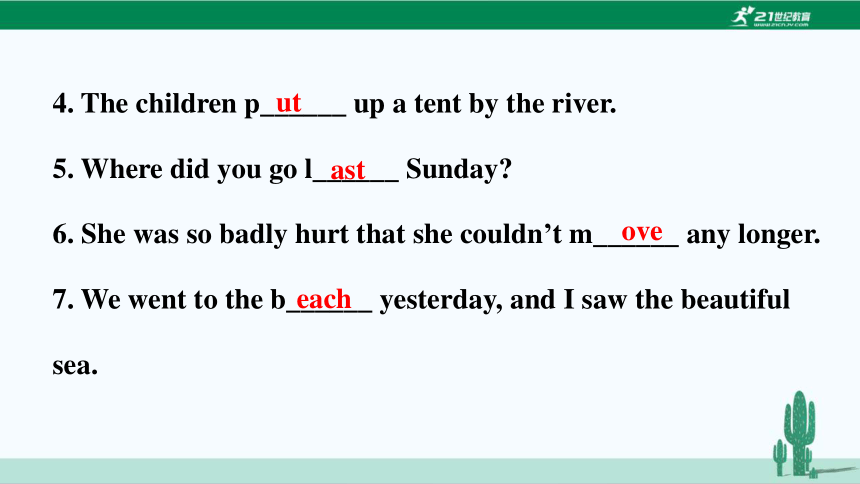
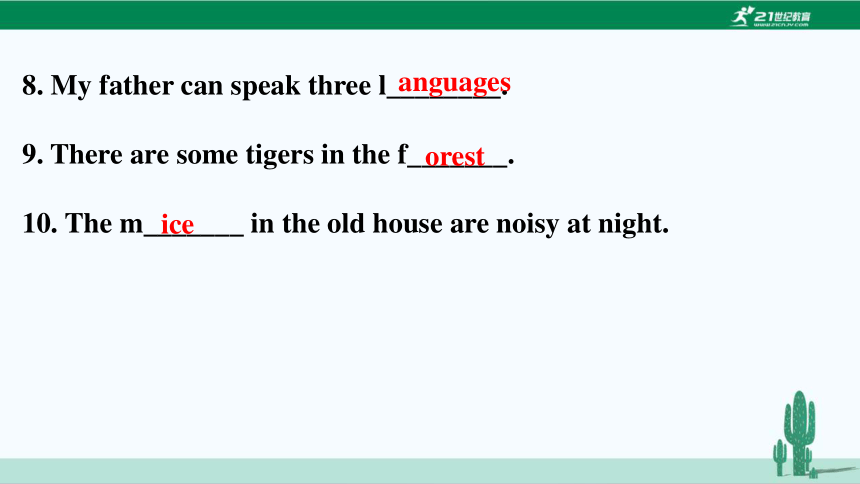
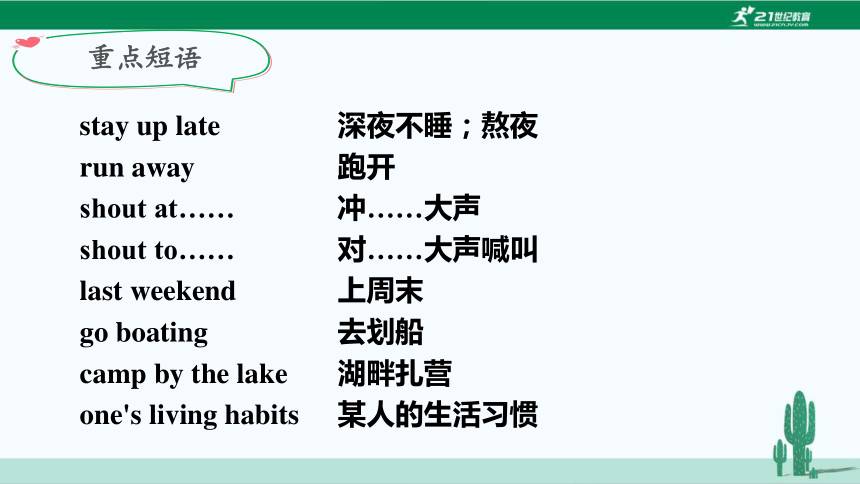
文档简介
(共85张PPT)
Unit 12 单元综合复习
人教版七年级下册
Content
词汇、短语回顾
01
重点句子回顾
02
重点词句精讲
03
语法知识精讲
04
单元话题写作
05
能力提升训练
06
目录
词汇、短语回顾
camp v. 扎营;搭帐篷-----camp n. 营地
lake n. 湖;湖泊
beach n. 海滩;沙滩-----beaches(复数)
badminton n. 羽毛球运动
sheep n.羊;绵羊-----—sheep(复数)
as prep. 作为;当作
kite n. 风筝
重点词汇及词汇拓展
fly v. 飞 -----flew(过去式)-----flies (单三)
India n. 印度 -----Indian n. 印度人;adj. 印度的
tent n. 帐篷
high adj.&adv.高的(地)
moon n. 月亮
ago adv. 以前
surprise n. 惊奇;惊讶-----surprising adj. 令人惊讶的 -----surprised adj. 惊讶的;吃惊的
natural adj. 自然的 -----nature n. 自然
butterfly n. 蝴蝶-----butterflies(复数)
visitor n. 游客;访问者 -----visit v. 参观;访问
tired adj. 疲倦的;疲劳的----- tire v. (使)疲劳,疲倦
stay v. 停留;待
away adv. 离开;远离
mouse n. 老鼠;耗子-----mice(复数)
baby adj. 幼小的;n. 婴儿-----babies(复数)
shout v. 呼叫;喊叫
language n. 语言
snake n. 蛇
scared adj. 惊慌的; 吓坏了的-----scare v. 使害怕;n. 害怕
move v. 移动
start v. 开始;着手-----begin(同义词)
jump v. 跳; 跃
wake v. 弄醒;醒 -----woke(过去式)----- awake adj. 醒着;v. (使)醒来;唤醒
into prep. 到……里面;进入
forest n. 森林
ear n. 耳朵 ,
一、根据句意及汉语或首字母提示完成单词。
即讲即练
1. He works in a factory a______ a manager.
2. He was taking a walk in the park when he heard the s______ “Help! Help me!”from the lake.
3. What time do you w______ up every day
s
hout
ake
4. The children p______ up a tent by the river.
5. Where did you go l______ Sunday
6. She was so badly hurt that she couldn’t m______ any longer.
7. We went to the b______ yesterday, and I saw the beautiful sea.
ut
ast
ove
each
8. My father can speak three l________.
9. There are some tigers in the f_______.
10. The m_______ in the old house are noisy at night.
anguages
orest
ice
stay up late 深夜不睡;熬夜
run away 跑开
shout at…… 冲……大声
shout to…… 对……大声喊叫
last weekend 上周末
go boating 去划船
camp by the lake 湖畔扎营
one's living habits 某人的生活习惯
重点短语
feed sheep 喂羊
as a guide 作为一名导游
tell sb. about…… 告诉某人关于……
go with sb. 和某人一起去
have a good weekend 度过一个愉快的周末
play badminton 打羽毛球
fly a kite 放风筝
put up 搭起;举起
each other 互相;彼此
get a surprise 吃惊
up and down 上上下下;起伏
wake……up 把……弄醒
a special gift 一件特殊的礼物
keep sb. warm 使某人暖和
on the first night 在第一个夜晚
tell a story 讲故事
go to sleep 入睡,睡着
look out of 朝外看
start to do sth. 开始做某事
jump up and down 跳上跳下
move into 搬进
make a fire 生火
something interesting 有趣的事情
finish high school 高中毕业
clean one's room 打扫房间
on Saturday night 在周六晚上
have dinner with sb. 和某人一起吃晚饭
stay at home 待在家里
have a busy weekend 度过一个繁忙的周末
talk show 脱口秀
study for…… 为……学习
即讲即练
1. 他们正在湖边散步。
They are taking a walk ______ ______ ______.
2. 你不能向老师大喊大叫。
You can’t _______ _______ your teachers.
3. -谁把窗户打开的?-莉莉。
-______ opened the window -Lily_____.
一、根据汉语提示完成句子。
by the lake
Who did
shout at
4. 对大多数女生来说,数学有点难。
______ _______ girls, math is a little ___________.
5. 许多人喜欢在春天放风筝。
Many people like to _______ _______ in spring.
6. 他上周日做了些什么事?
What ______he ______ last Sunday
7. 我昨天开了一个聚会,很成功。
I _______ _______ ________ yesterday. It _______ great.
did do
For most difficult
fly kites
had a party was
重点句子回顾
1.—What did you do last weekend 上个周末你做什么了?
—I did my homework. 我做我的家庭作业了。
2.—Hi, Lisa. How was your weekend 你好,Lisa。 周末过得怎么样?
—Great, thanks. 好极了,谢谢。
3.—Did you have a good weekend 你周末过得愉快吗?
—Yeah, it was good, but I'm kind of tired now. I stayed up late to watch the soccer game. 愉快,但我现在有点累,我熬夜看足球赛了。
4. Who did she go with 她和谁一起去的?
5. I worked as a guide at the Natural History Museum. 我在自然历史博物馆当了一名导游。
6.They have a butterfly house with over 200 kinds of butterflies!
它们(博物馆)有一座房子,里面有200多种蝴蝶!
7. “ Well, son, that's why it's important to learn a second language,” answered Father Mouse.“所以嘛,儿子,那就是学会一门外语很重要的原因,”鼠爸爸回答道。
8. My sister finished high school two weeks ago. 我的姐姐两周前高中毕业了。
9. The next morning, my sister and I got a terrible surprise.
第二天早晨,我姐姐和我大吃一惊。
10.What an interesting job they have! 他们有一份多么有趣的工作啊!
11.As a special gift, our parents took us to India.
作为一份特殊的礼物,我爸妈带着我们去了印度。
12. There we put up our tents and made a fire to keep us warm and cook food on.
在那里我们搭起帐篷,生火取暖并做饭。
13. I was so tired that I went to sleep early. 我如此累以至于很早就睡着了。
14. When we looked out of our tent, we saw a big snake sleeping near the fire.
当我们向帐篷外面看时,我们看见一条大蛇正在火附近睡觉。
15.This woke the snake up and it moved into the forest near the lake.
这吵醒了蛇,它爬到湖附近的森林里了。
16.This was a very useful lesson for me. 这对我来说是很有用的一课。
重点词句精讲
1. last 用法
last weekend/month/year/week 上周末/月/年/周
表示过去的时间状语,是过去时的标志词
What did you do last weekend 上周末你做了什么?
She went to Beijing last week.她上周去了北京。
this week 这周
next week 下周
2. camp用法
v. 扎营
go camping 去野营 ;camp out 野营;露营
n. 营地
summer camp夏令营;winter camp冬令营。
We might go camping this summer.今年夏天我们可能去野营。
The children go to camp every summer.孩子们每年夏天都去野营。
3.as的用法
as 介词,意为“作为,当做”
In China, we learn English as a foreign language.在中国,我们把英语当做一门外语来学。
as作连词,引导方式状语从句、时间状语从句、原因状语从句
常用结构:as...as... 与...一样
not so/as...as... 不及...
as...as possible 尽可能地
as soon as 一...就...(引导时间状语从句时,注意时态主将从现)
As you are busy, let me do it instead.既然你很忙,让我替你做吧。
They talked as they walked.他们边走边谈。
I think English is as important as Chinese.我认为英语与汉语一样重要。
4.tired的用法
tired adj. 疲倦的,疲劳的。人做主语
常见短语:
be tired of doing sth.厌烦做某事
be tired from 因...而疲倦
be tired out 筋疲力尽的
The tiring work made all the workers tired.这累人的工作使所有工人都感到疲倦。
【拓展】tired与tiring
tired tired形容词,意为“疲倦的;疲劳的”,一般用来修饰人。be/get tired of 对……厌烦
tiring tiring意为“令人劳累的;令人疲劳的”,一般用来修饰物。
eg:It was good, but I'm kind of tired now. 挺好的,但是我现在有点儿累了。
You look so tired. 你看起来很累。
He felt very tired after playing football. 他踢完足球后感觉很累。
She got tired of watching TV all day. 她对整天看电视感到厌烦了。
It was a tiring day and she felt very tired. 这是累人的一天,她感觉很累。
5.visitor用法
visitor可数名词,意为“游客;访问者”,是由动词visit加后缀-or构成的名词。
eg:I told the visitors about them and their living habits.
我向游客讲解这些蝴蝶及它们的生活习惯
He is an English visitor. 他是一名英国游客。
一些动词的后面加-er构成名词,表示发出此动作的人;而visit则是加-or构成名词。
①常见的v.+-er构成的名词
eg:play→player(运动员) sing→singer(歌手)teach→teacher(教师) work→worker(工人)build→builder(建设者) train→trainer(训练员)
②常见的v.+-or构成的名词
visit→visitor(参观者) invent→inventorC发明家)
collect→collector(收集者,收藏家)
6. stay 的用法
作实义动词,意为 “停留,待”
Stay at home.呆在家里。
I stayed up to write a report last night.昨晚我熬夜写一份报告。
作系动词,意为“保持”,想打与keep。
stay up 熬夜,不睡觉 stay healthy 保持健康
stay away from 远离 stay in touch with sb. 和某人保持联系
I am not allowed to stay up late by my parents.我父母不允许我熬夜。
7.shout 的相关短语
shout at... 冲着...吼叫,对...大喊大叫。
shout to... 对着...喊叫
【注意】shout at...带有责备/警告的意思,表示某人非常生气,shout to... 是一个中性短语,只是陈述一个事实。
She was so angry that she shouted at me.
她非常生气,对我大声吼叫。
He shouted to me when he saw a snake behind me.
当他发现我身后有一条蛇时,便对我大声喊叫。
8.away的用法
away是副词,意为“离开,远离”。
相关的短语:
run away跑开,逃走 be away from 离开
go away 走开 put away 把...收拾好
far away 远,远离 far away from 离...远
take away 拿走,带走
take away from 从...拿走或带走。
keep / stay away from 远离...
run away from 逃避,从...逃走
throw away 扔掉 give away 捐赠
The young man ran away when he saw a big bear.那个年轻人看到一只大熊就跑掉了。
The boy ran away from the back door.这男孩从后门逃跑了。
9.ago的用法
“一段时间+ago” 表示“多长时间以前(从现在算起,多长时间之前)”,与过去时连用。
I met him two days ago.我在两天前遇到过他。
【拓展】和 before的区别
before+时间点或事件”,表示“在某具体的时间/事件之前”。
Please come to see me before six o’clock.请在六点钟以前来见我。
I must finish this letter before I go home.我必须在回家以前写完这封信。
10.put 的相关短语
put up 搭起,建造;举起;挂起;张贴(标语,海报,布告)
put off 推迟 put on 穿上
put down 记下,放下 put out 熄灭;扑灭
put away 收拾好 put in 提出,提交
put ... into... 把...放入... put through 接通电话
11.so...that...的用法
so...that...意为“如此...以至于...”,so后常接形容词或副词的原级,引导结果状语从句。
The problem is so difficult that I can’t work it out.这道题太难了,我解不出来。
注意:so...that 可以和 too...to...互相转换
The problem is too difficult to work it out.这道题太难了,我解不出来。
【拓展】
so that用法
so that “以便,为的是”,引导目的状语从句。
Please speak more slowly so that we can follow you better.请说的再慢一点,以便我们能更好地跟上你说的话。
such...that
such...that 也表示“如此...以至于...”,引导结果状语从句。
句型:①such + a/an + adj. + 单数可数名词 + that 从句
②such + adj. + 复数可数名词 / 不可数名词 + that 从句
12.surprise的用法
surprise n. 惊奇,诧异;v. 使惊奇,使感到意外
短语:to one’s surprise 使某人感到惊讶的是...,相当于“主语 + be surprised to do sth”。
in surprise 惊讶地、惊奇地(修饰动词)=surprisedly
get a surprise 吃惊
get a terrible surprise 大吃一惊
To his surprise, he found the girl was blind.令他惊讶的是,他发现这个女孩是个盲人。
He was surprised to find the girl the girl was blind.令他惊讶的是,他发现这个女孩是个盲人。
The two girls looked at each other in surprise.那两个女孩惊奇地相互看着。
【拓展】surprised 感到吃惊的,人做主语
surprising 令人惊奇的,物做主语或在句子中作定语
13.look out of 和 look out
look out of ... 从...往外看。
look out 向外看
She stood at the window and looked out.
她站在窗边朝外看。
Don’t look out of the window.
别向窗外看。
14.see sb./sth. doing sth.的用法
看见某人/某物正在做某事,即看见动作正在进行。
The teacher saw Jim reading English when she came in.老师进来时,看见Jim在读英语。
【拓展】
see sb./sth/ do sth. 看见了某人/某物做某事的全过程或经常性动作。
I often see John play basketball after school.我经常放学后看见约翰打篮球。
注意:能这样用的词还有:hear watch notice
15.scared的用法
scared adj. 恐怖的,恐惧的,可做定语和表语。
相关搭配:
be scared of sth 害怕... 恐惧...
be scared that... 害怕...
be scared of doing sth. 害怕做某事
be scared to do sth. 害怕去做某事。
She is scared of walking alone at night.她害怕晚上一个人走路。
He was scared to cross that bridge.他害怕过那座桥。
16.move的用法
move v. 移动,搬动
相关短语: move around 不停地走动,围绕...转
move on 往前走 move to sp. 搬往某地
move away 搬走;离开 move in 搬到某处;迁入
I’m going to move somewhere interesting.我打算搬到有趣的地方居住。
【拓展】moved和moving
moved 感动的,人做主语。
moving 令人感动的,作定语或物做主语。
The novel is so moving and I was moved by the story.这本小说太感人了,我被里面的故事感动了。
17. start的用法
常用搭配: to start with 首先,第一
start doing/to do sth. 开始做某事。
【拓展】
start 和 begin 是同义词,一般可以互相转换。都可以跟不定式,和v-ing,区别不大。
但是!当主语是物而不是人时,start/begin 只能跟不定式。
In spring, the trees turn green and the flowers start to come out.春天,树变绿了,花儿开始盛开。
Mark an outline before you start writing.
开始写作之前先拟提纲。
The leaves began to to turn yellow.
树叶开始变黄。
18.jump 的用法
jump v. 跳跃;n. 跳跃。
相关短语:
jump up 跳起来 jump over 跳过
jump into 跳进 long jump 跳远
high jump 跳高 jump off 跳下
The monkey jumped off the tree.猴子从树上跳下来。
My little brother likes to jump up and down like a monkey.我弟弟喜欢像猴子一样跳上跳下
19.wake up
wake up 意为“醒来;睡醒”。
短语:wake sb. up意为“把某人弄醒”。后接名词作宾语时,名词可放在wake与up之间或up的后面;后接人称代词作宾语时,放在wake与up之间。
eg:The noise woke me up. 那噪音把我吵醒了。
He wakes his brother up every morning. 他每天早晨叫醒他弟弟。
20.--Who visited her grandma
--Becky did.
did代替上面提到的动词短语visited her grandma.
在英语中,用do/does或did代替上文的动词或动词短语。
I don’t have long hair, but my sister does.我没有长发,但我妹妹有。
--Who cleaned the blackboard yesterday 昨天谁擦黑板了?
--John did.约翰做到了。
21.How interesting!多么有趣啊!
这是一个感叹句,省略了主语和谓语动词,其完整结构为How interesting it was!
【拓展】
由how引导的感叹句结构有:
How + 形容词或副词 (+主语 + 谓语)!
How + 主语 + 谓语!
How clever the dog is! 这条狗多聪明啊!
How time flies!时光飞逝!
How fast he run!他跑得多快!
感叹句也可以用what 引导
结构有:
What + a/an + 形容词 + 可数名词单数 (+ 主语 + 谓语)!
What + 形容词 + 可数名词复数 + (+ 主语 + 谓语)
What + 形容词 + 不可数名词 + (+ 主语 + 谓语)!
What a useful book it is!这是一本多么有用的书!
What beautiful mountains they are!多么美丽的山脉啊!
What fine weather it is!天气真好!
22. My dad told me later that snakes don’t have ears but can feel things moving.我爸爸后来告诉我,蛇没有耳朵,但能感觉到东西在动。
宾语从句中的时态选择:
主句是过去时,宾语从句只能选用表示过去的某种时态(即一般过去时、过去进行时等);
当宾语从句表达的是客观真理、自然现象、格言、谚语、定律等时,不受主句时态的限制,只用一般现在时。
Our teacher said the earth travels round the sun.我们老师曾经说地球围绕着太阳转。
The teacher told us that the light travels faster than the sound.老师告诉我们光传播的速度比声音快。
语法知识精讲
一般过去时的各种句型
1.肯定句变为否定句
当句中含有情态动词could, would, should或连系动词was, were时等时,直接在后面加not。
eg:I could get you a concert ticket. 我能给你一张音乐会的票。
I could not/couldn’t get you a concert ticket. 我不能给你一张音乐会的票。
I was on the Internet when you called me.你给我打电话时我正在上网。
I was not/wasn't on the Internet when you called me. 你给我打电话时我没在上网。
当句中谓语是实义动词时,在该动词之前加did not/didn't,动词还原为原形,构成否定句。
eg:The famous singer sang some Chinese songs.这位著名的歌手唱了几首中文 歌曲。
The famous singer did not/didn't sing any Chinese songs.
这位著名的歌手没有唱中文歌曲。
2.陈述句变为一般疑问句
当句中含有情态动词could, would, should或连系动词was, were时等时,将was, were, could, would,should等移到句首。
eg:He could pack his things himself.他能自己把东西打包。
→Could he pack his things himself 他能自己把东西打包吗?
I was really happy. 我真的很高兴
→Was you really happy? 你真的很开心吗
谓语是除情态动词、助动词、连系动词(was, were)以外的动词时,在主语之前加did,动词还原。
eg:Mr. Li looked very old. 李先生看起来很老。
→Did Mr. Li look very old 李先生看起来很老吗?
3.陈述句变为特殊疑问句
确定疑问词:人who/whom,物what,地点 where,时间 when/what time,原因why,频率 how often,长度how long,距离how far等。
特殊疑问句的结构为:疑问词+情态动词/助动词/连系动词 +主语+其他?
(1)当疑问词在句中作主语时,用“疑问词+was/ were + 其他?”或“疑问词 + 动词过去式+ 其他?”。
(2)当疑问词作宾语或状语时,用“疑问词 + was / were + 主语 + 其他?”或“疑问词 + did + 主语 + 动词原形 + 其他?”。
eg:They gave the concert last night. 他们昨晚举办了音乐会(问时间,用when)
→When did they give the concert 他们何时举办了音乐会?
The accident happened near the station. 那起事故是在车站附近发生的。
→Where did the accident happen 那起事故是在哪里发生的?
—Who was your English teacher last year 去年谁是你的英语老师?
— Miss Yang. 杨老师。
—Who watched the basketball game 谁看了篮球比赛?
—Tom did. 汤姆看了。
单元话题写作
单元话题写作
单元写作目标
此单元以 “周末活动”为中心话题,让学生学会用一般过去时描述周末活动。
素材积累
相关词汇:
1.lake 湖 2.beach 沙滩
3.sheep 羊 4.visitor 游客
5.tired 疲倦的 6.forest 森林
7.on Saturday morning在星期六上午
8.watch TV for an hour 看电视一个小时
素材积累
相关词汇:
9.a little difficult 有点难
10.play badminton 打羽毛球
11.stay up late 熬夜
12.fly a kite 放风筝
13.go camping 去露营
相关句型:
开头句
1.I had a busy weekend and let me tell you what I did.
2.Last Sunday, we went to…
中间句
In the afternoon,I played the piano and played basketball with my cousin.
结尾句
1.What a really busy weekend!
2.Would you like to tell me something about your weekend
范例
假如你是张华,你的英国笔友Jack给你发来电子邮件,询问你是如何度过上个周末的,请你根据下表提示给他回复一封电子邮件,和他分享你的周末活动。
张华的周末 星期六 上午 和朋友去参观科学博物馆
下午 和爸爸去钓鱼
晚上 读书后看了一小时的电视
星期日 上午 写作业
下午 弹钢琴,打篮球
晚上 和父母散步
要求:(1)短文须包括表格中所有提示内容,可适当发挥;
(2)词数不少于60词,电子邮件的开头已给出,不计入总词数。
Dear Jack,
I had a really busy weekend. _________________________
审题:
1.文体:记叙文
2.时态:一般过去时
3.人称:第一人称
Dear Jack,
I had a really busy weekend. On Saturday morning,I visited the science museum with my friends. It was fun. In the afternoon,I went fishing with my father. In the evening,I read some interesting books and then I watched TV for an hour at home. On Sunday morning, I did my homework. It was a little difficult. In the afternoon,I played the piano and played basketball with my cousin. In the evening,I took a walk with my parents. At about ten,I went to bed. What a really busy weekend! What did you do last weekend Write to me soon.
Yours,
Zhang Hua
能力提升训练
一、用括号内所给单词的适当形式填空。
1. They went __________ (camp) last weekend.
2. There are a lot of __________ (visit) in Beijing.
3. I was very___________ (surprise) at the news.
4. He is much too ________ (tire) after hard work.
5. Did you ______ (stay) up late yesterday
camping
surprised
tired
visitors
stay
6. How many ________ (sheep) are there on the farm
7. Last Sunday, we _________(visit)our aunt and ______ (have) a good time.
8. There ______ (be) a telephone call for you two minutes ago.
9. He ______ (see) an old man in the yard when he came in.
10. What ______ you _______ (do) last Sunday
had
sheep
visited
do
saw
was
did
二、根据括号内的要求完成下列各题,每空一词。
1. They went to Beidaihe on vacation. (改为一般疑问句)
_______ they ______ to Beidaihe on vacation
2. He did his homework after school. (改为否定句)
He ______ _______ his homework after school.
3. My family visited Hangzhou last summer. (就划线部分提问) _______ ________ your family _______ last summer
Did go
didn’t do
Where did visit
4. I cleaned my room last Sunday.(就划线部分提问)
______ did you _____ last Sunday
5. She was at home yesterday. (改为否定句)
She ______ at home yesterday.
6. How excellent the teacher is! (改为同义句)
_______ ________ ________ teacher he is!
What do
wasn’t
What an excellent
三、书面表达
周末的生活总是丰富多彩的,假如你是李华,上周你度过了一个忙碌而又快乐的周末。请你根据下面的表格内容和要求写一篇英语短文,介绍一下你周末的活动和感受。
Saturday Morning: camp near the river; go boating; play football
Evening: make a fire to cook; enjoy the beautiful night
Sunday Morning: do my homework; study for the English test
Afternoon: swim
注意:
(1). 短文须包括表格中的全部信息,可适当发挥;
(2). 文中不得出现真实的地名、校名和人名;
(3). 词数:60~80词。
One possible version:
My name is Li Hua. Last week, I spent a busy but happy weekend. On Saturday morning, I went camping with my family near the river. We went boating in the river and played football on the grass. It was relaxing to do sports in the open air. In the evening, we made a fire to cook food. How delicious it was! After supper, we sat under the moon and enjoyed the beautiful and quiet night. On Sunday morning, I did my homework carefully and studied for the English test at home. In the afternoon, I went swimming with my friends in the pool. It was cool. We had great fun.
谢谢
21世纪教育网(www.21cnjy.com)
中小学教育资源网站
兼职招聘:
https://www.21cnjy.com/recruitment/home/admin
Unit 12 单元综合复习
人教版七年级下册
Content
词汇、短语回顾
01
重点句子回顾
02
重点词句精讲
03
语法知识精讲
04
单元话题写作
05
能力提升训练
06
目录
词汇、短语回顾
camp v. 扎营;搭帐篷-----camp n. 营地
lake n. 湖;湖泊
beach n. 海滩;沙滩-----beaches(复数)
badminton n. 羽毛球运动
sheep n.羊;绵羊-----—sheep(复数)
as prep. 作为;当作
kite n. 风筝
重点词汇及词汇拓展
fly v. 飞 -----flew(过去式)-----flies (单三)
India n. 印度 -----Indian n. 印度人;adj. 印度的
tent n. 帐篷
high adj.&adv.高的(地)
moon n. 月亮
ago adv. 以前
surprise n. 惊奇;惊讶-----surprising adj. 令人惊讶的 -----surprised adj. 惊讶的;吃惊的
natural adj. 自然的 -----nature n. 自然
butterfly n. 蝴蝶-----butterflies(复数)
visitor n. 游客;访问者 -----visit v. 参观;访问
tired adj. 疲倦的;疲劳的----- tire v. (使)疲劳,疲倦
stay v. 停留;待
away adv. 离开;远离
mouse n. 老鼠;耗子-----mice(复数)
baby adj. 幼小的;n. 婴儿-----babies(复数)
shout v. 呼叫;喊叫
language n. 语言
snake n. 蛇
scared adj. 惊慌的; 吓坏了的-----scare v. 使害怕;n. 害怕
move v. 移动
start v. 开始;着手-----begin(同义词)
jump v. 跳; 跃
wake v. 弄醒;醒 -----woke(过去式)----- awake adj. 醒着;v. (使)醒来;唤醒
into prep. 到……里面;进入
forest n. 森林
ear n. 耳朵 ,
一、根据句意及汉语或首字母提示完成单词。
即讲即练
1. He works in a factory a______ a manager.
2. He was taking a walk in the park when he heard the s______ “Help! Help me!”from the lake.
3. What time do you w______ up every day
s
hout
ake
4. The children p______ up a tent by the river.
5. Where did you go l______ Sunday
6. She was so badly hurt that she couldn’t m______ any longer.
7. We went to the b______ yesterday, and I saw the beautiful sea.
ut
ast
ove
each
8. My father can speak three l________.
9. There are some tigers in the f_______.
10. The m_______ in the old house are noisy at night.
anguages
orest
ice
stay up late 深夜不睡;熬夜
run away 跑开
shout at…… 冲……大声
shout to…… 对……大声喊叫
last weekend 上周末
go boating 去划船
camp by the lake 湖畔扎营
one's living habits 某人的生活习惯
重点短语
feed sheep 喂羊
as a guide 作为一名导游
tell sb. about…… 告诉某人关于……
go with sb. 和某人一起去
have a good weekend 度过一个愉快的周末
play badminton 打羽毛球
fly a kite 放风筝
put up 搭起;举起
each other 互相;彼此
get a surprise 吃惊
up and down 上上下下;起伏
wake……up 把……弄醒
a special gift 一件特殊的礼物
keep sb. warm 使某人暖和
on the first night 在第一个夜晚
tell a story 讲故事
go to sleep 入睡,睡着
look out of 朝外看
start to do sth. 开始做某事
jump up and down 跳上跳下
move into 搬进
make a fire 生火
something interesting 有趣的事情
finish high school 高中毕业
clean one's room 打扫房间
on Saturday night 在周六晚上
have dinner with sb. 和某人一起吃晚饭
stay at home 待在家里
have a busy weekend 度过一个繁忙的周末
talk show 脱口秀
study for…… 为……学习
即讲即练
1. 他们正在湖边散步。
They are taking a walk ______ ______ ______.
2. 你不能向老师大喊大叫。
You can’t _______ _______ your teachers.
3. -谁把窗户打开的?-莉莉。
-______ opened the window -Lily_____.
一、根据汉语提示完成句子。
by the lake
Who did
shout at
4. 对大多数女生来说,数学有点难。
______ _______ girls, math is a little ___________.
5. 许多人喜欢在春天放风筝。
Many people like to _______ _______ in spring.
6. 他上周日做了些什么事?
What ______he ______ last Sunday
7. 我昨天开了一个聚会,很成功。
I _______ _______ ________ yesterday. It _______ great.
did do
For most difficult
fly kites
had a party was
重点句子回顾
1.—What did you do last weekend 上个周末你做什么了?
—I did my homework. 我做我的家庭作业了。
2.—Hi, Lisa. How was your weekend 你好,Lisa。 周末过得怎么样?
—Great, thanks. 好极了,谢谢。
3.—Did you have a good weekend 你周末过得愉快吗?
—Yeah, it was good, but I'm kind of tired now. I stayed up late to watch the soccer game. 愉快,但我现在有点累,我熬夜看足球赛了。
4. Who did she go with 她和谁一起去的?
5. I worked as a guide at the Natural History Museum. 我在自然历史博物馆当了一名导游。
6.They have a butterfly house with over 200 kinds of butterflies!
它们(博物馆)有一座房子,里面有200多种蝴蝶!
7. “ Well, son, that's why it's important to learn a second language,” answered Father Mouse.“所以嘛,儿子,那就是学会一门外语很重要的原因,”鼠爸爸回答道。
8. My sister finished high school two weeks ago. 我的姐姐两周前高中毕业了。
9. The next morning, my sister and I got a terrible surprise.
第二天早晨,我姐姐和我大吃一惊。
10.What an interesting job they have! 他们有一份多么有趣的工作啊!
11.As a special gift, our parents took us to India.
作为一份特殊的礼物,我爸妈带着我们去了印度。
12. There we put up our tents and made a fire to keep us warm and cook food on.
在那里我们搭起帐篷,生火取暖并做饭。
13. I was so tired that I went to sleep early. 我如此累以至于很早就睡着了。
14. When we looked out of our tent, we saw a big snake sleeping near the fire.
当我们向帐篷外面看时,我们看见一条大蛇正在火附近睡觉。
15.This woke the snake up and it moved into the forest near the lake.
这吵醒了蛇,它爬到湖附近的森林里了。
16.This was a very useful lesson for me. 这对我来说是很有用的一课。
重点词句精讲
1. last 用法
last weekend/month/year/week 上周末/月/年/周
表示过去的时间状语,是过去时的标志词
What did you do last weekend 上周末你做了什么?
She went to Beijing last week.她上周去了北京。
this week 这周
next week 下周
2. camp用法
v. 扎营
go camping 去野营 ;camp out 野营;露营
n. 营地
summer camp夏令营;winter camp冬令营。
We might go camping this summer.今年夏天我们可能去野营。
The children go to camp every summer.孩子们每年夏天都去野营。
3.as的用法
as 介词,意为“作为,当做”
In China, we learn English as a foreign language.在中国,我们把英语当做一门外语来学。
as作连词,引导方式状语从句、时间状语从句、原因状语从句
常用结构:as...as... 与...一样
not so/as...as... 不及...
as...as possible 尽可能地
as soon as 一...就...(引导时间状语从句时,注意时态主将从现)
As you are busy, let me do it instead.既然你很忙,让我替你做吧。
They talked as they walked.他们边走边谈。
I think English is as important as Chinese.我认为英语与汉语一样重要。
4.tired的用法
tired adj. 疲倦的,疲劳的。人做主语
常见短语:
be tired of doing sth.厌烦做某事
be tired from 因...而疲倦
be tired out 筋疲力尽的
The tiring work made all the workers tired.这累人的工作使所有工人都感到疲倦。
【拓展】tired与tiring
tired tired形容词,意为“疲倦的;疲劳的”,一般用来修饰人。be/get tired of 对……厌烦
tiring tiring意为“令人劳累的;令人疲劳的”,一般用来修饰物。
eg:It was good, but I'm kind of tired now. 挺好的,但是我现在有点儿累了。
You look so tired. 你看起来很累。
He felt very tired after playing football. 他踢完足球后感觉很累。
She got tired of watching TV all day. 她对整天看电视感到厌烦了。
It was a tiring day and she felt very tired. 这是累人的一天,她感觉很累。
5.visitor用法
visitor可数名词,意为“游客;访问者”,是由动词visit加后缀-or构成的名词。
eg:I told the visitors about them and their living habits.
我向游客讲解这些蝴蝶及它们的生活习惯
He is an English visitor. 他是一名英国游客。
一些动词的后面加-er构成名词,表示发出此动作的人;而visit则是加-or构成名词。
①常见的v.+-er构成的名词
eg:play→player(运动员) sing→singer(歌手)teach→teacher(教师) work→worker(工人)build→builder(建设者) train→trainer(训练员)
②常见的v.+-or构成的名词
visit→visitor(参观者) invent→inventorC发明家)
collect→collector(收集者,收藏家)
6. stay 的用法
作实义动词,意为 “停留,待”
Stay at home.呆在家里。
I stayed up to write a report last night.昨晚我熬夜写一份报告。
作系动词,意为“保持”,想打与keep。
stay up 熬夜,不睡觉 stay healthy 保持健康
stay away from 远离 stay in touch with sb. 和某人保持联系
I am not allowed to stay up late by my parents.我父母不允许我熬夜。
7.shout 的相关短语
shout at... 冲着...吼叫,对...大喊大叫。
shout to... 对着...喊叫
【注意】shout at...带有责备/警告的意思,表示某人非常生气,shout to... 是一个中性短语,只是陈述一个事实。
She was so angry that she shouted at me.
她非常生气,对我大声吼叫。
He shouted to me when he saw a snake behind me.
当他发现我身后有一条蛇时,便对我大声喊叫。
8.away的用法
away是副词,意为“离开,远离”。
相关的短语:
run away跑开,逃走 be away from 离开
go away 走开 put away 把...收拾好
far away 远,远离 far away from 离...远
take away 拿走,带走
take away from 从...拿走或带走。
keep / stay away from 远离...
run away from 逃避,从...逃走
throw away 扔掉 give away 捐赠
The young man ran away when he saw a big bear.那个年轻人看到一只大熊就跑掉了。
The boy ran away from the back door.这男孩从后门逃跑了。
9.ago的用法
“一段时间+ago” 表示“多长时间以前(从现在算起,多长时间之前)”,与过去时连用。
I met him two days ago.我在两天前遇到过他。
【拓展】和 before的区别
before+时间点或事件”,表示“在某具体的时间/事件之前”。
Please come to see me before six o’clock.请在六点钟以前来见我。
I must finish this letter before I go home.我必须在回家以前写完这封信。
10.put 的相关短语
put up 搭起,建造;举起;挂起;张贴(标语,海报,布告)
put off 推迟 put on 穿上
put down 记下,放下 put out 熄灭;扑灭
put away 收拾好 put in 提出,提交
put ... into... 把...放入... put through 接通电话
11.so...that...的用法
so...that...意为“如此...以至于...”,so后常接形容词或副词的原级,引导结果状语从句。
The problem is so difficult that I can’t work it out.这道题太难了,我解不出来。
注意:so...that 可以和 too...to...互相转换
The problem is too difficult to work it out.这道题太难了,我解不出来。
【拓展】
so that用法
so that “以便,为的是”,引导目的状语从句。
Please speak more slowly so that we can follow you better.请说的再慢一点,以便我们能更好地跟上你说的话。
such...that
such...that 也表示“如此...以至于...”,引导结果状语从句。
句型:①such + a/an + adj. + 单数可数名词 + that 从句
②such + adj. + 复数可数名词 / 不可数名词 + that 从句
12.surprise的用法
surprise n. 惊奇,诧异;v. 使惊奇,使感到意外
短语:to one’s surprise 使某人感到惊讶的是...,相当于“主语 + be surprised to do sth”。
in surprise 惊讶地、惊奇地(修饰动词)=surprisedly
get a surprise 吃惊
get a terrible surprise 大吃一惊
To his surprise, he found the girl was blind.令他惊讶的是,他发现这个女孩是个盲人。
He was surprised to find the girl the girl was blind.令他惊讶的是,他发现这个女孩是个盲人。
The two girls looked at each other in surprise.那两个女孩惊奇地相互看着。
【拓展】surprised 感到吃惊的,人做主语
surprising 令人惊奇的,物做主语或在句子中作定语
13.look out of 和 look out
look out of ... 从...往外看。
look out 向外看
She stood at the window and looked out.
她站在窗边朝外看。
Don’t look out of the window.
别向窗外看。
14.see sb./sth. doing sth.的用法
看见某人/某物正在做某事,即看见动作正在进行。
The teacher saw Jim reading English when she came in.老师进来时,看见Jim在读英语。
【拓展】
see sb./sth/ do sth. 看见了某人/某物做某事的全过程或经常性动作。
I often see John play basketball after school.我经常放学后看见约翰打篮球。
注意:能这样用的词还有:hear watch notice
15.scared的用法
scared adj. 恐怖的,恐惧的,可做定语和表语。
相关搭配:
be scared of sth 害怕... 恐惧...
be scared that... 害怕...
be scared of doing sth. 害怕做某事
be scared to do sth. 害怕去做某事。
She is scared of walking alone at night.她害怕晚上一个人走路。
He was scared to cross that bridge.他害怕过那座桥。
16.move的用法
move v. 移动,搬动
相关短语: move around 不停地走动,围绕...转
move on 往前走 move to sp. 搬往某地
move away 搬走;离开 move in 搬到某处;迁入
I’m going to move somewhere interesting.我打算搬到有趣的地方居住。
【拓展】moved和moving
moved 感动的,人做主语。
moving 令人感动的,作定语或物做主语。
The novel is so moving and I was moved by the story.这本小说太感人了,我被里面的故事感动了。
17. start的用法
常用搭配: to start with 首先,第一
start doing/to do sth. 开始做某事。
【拓展】
start 和 begin 是同义词,一般可以互相转换。都可以跟不定式,和v-ing,区别不大。
但是!当主语是物而不是人时,start/begin 只能跟不定式。
In spring, the trees turn green and the flowers start to come out.春天,树变绿了,花儿开始盛开。
Mark an outline before you start writing.
开始写作之前先拟提纲。
The leaves began to to turn yellow.
树叶开始变黄。
18.jump 的用法
jump v. 跳跃;n. 跳跃。
相关短语:
jump up 跳起来 jump over 跳过
jump into 跳进 long jump 跳远
high jump 跳高 jump off 跳下
The monkey jumped off the tree.猴子从树上跳下来。
My little brother likes to jump up and down like a monkey.我弟弟喜欢像猴子一样跳上跳下
19.wake up
wake up 意为“醒来;睡醒”。
短语:wake sb. up意为“把某人弄醒”。后接名词作宾语时,名词可放在wake与up之间或up的后面;后接人称代词作宾语时,放在wake与up之间。
eg:The noise woke me up. 那噪音把我吵醒了。
He wakes his brother up every morning. 他每天早晨叫醒他弟弟。
20.--Who visited her grandma
--Becky did.
did代替上面提到的动词短语visited her grandma.
在英语中,用do/does或did代替上文的动词或动词短语。
I don’t have long hair, but my sister does.我没有长发,但我妹妹有。
--Who cleaned the blackboard yesterday 昨天谁擦黑板了?
--John did.约翰做到了。
21.How interesting!多么有趣啊!
这是一个感叹句,省略了主语和谓语动词,其完整结构为How interesting it was!
【拓展】
由how引导的感叹句结构有:
How + 形容词或副词 (+主语 + 谓语)!
How + 主语 + 谓语!
How clever the dog is! 这条狗多聪明啊!
How time flies!时光飞逝!
How fast he run!他跑得多快!
感叹句也可以用what 引导
结构有:
What + a/an + 形容词 + 可数名词单数 (+ 主语 + 谓语)!
What + 形容词 + 可数名词复数 + (+ 主语 + 谓语)
What + 形容词 + 不可数名词 + (+ 主语 + 谓语)!
What a useful book it is!这是一本多么有用的书!
What beautiful mountains they are!多么美丽的山脉啊!
What fine weather it is!天气真好!
22. My dad told me later that snakes don’t have ears but can feel things moving.我爸爸后来告诉我,蛇没有耳朵,但能感觉到东西在动。
宾语从句中的时态选择:
主句是过去时,宾语从句只能选用表示过去的某种时态(即一般过去时、过去进行时等);
当宾语从句表达的是客观真理、自然现象、格言、谚语、定律等时,不受主句时态的限制,只用一般现在时。
Our teacher said the earth travels round the sun.我们老师曾经说地球围绕着太阳转。
The teacher told us that the light travels faster than the sound.老师告诉我们光传播的速度比声音快。
语法知识精讲
一般过去时的各种句型
1.肯定句变为否定句
当句中含有情态动词could, would, should或连系动词was, were时等时,直接在后面加not。
eg:I could get you a concert ticket. 我能给你一张音乐会的票。
I could not/couldn’t get you a concert ticket. 我不能给你一张音乐会的票。
I was on the Internet when you called me.你给我打电话时我正在上网。
I was not/wasn't on the Internet when you called me. 你给我打电话时我没在上网。
当句中谓语是实义动词时,在该动词之前加did not/didn't,动词还原为原形,构成否定句。
eg:The famous singer sang some Chinese songs.这位著名的歌手唱了几首中文 歌曲。
The famous singer did not/didn't sing any Chinese songs.
这位著名的歌手没有唱中文歌曲。
2.陈述句变为一般疑问句
当句中含有情态动词could, would, should或连系动词was, were时等时,将was, were, could, would,should等移到句首。
eg:He could pack his things himself.他能自己把东西打包。
→Could he pack his things himself 他能自己把东西打包吗?
I was really happy. 我真的很高兴
→Was you really happy? 你真的很开心吗
谓语是除情态动词、助动词、连系动词(was, were)以外的动词时,在主语之前加did,动词还原。
eg:Mr. Li looked very old. 李先生看起来很老。
→Did Mr. Li look very old 李先生看起来很老吗?
3.陈述句变为特殊疑问句
确定疑问词:人who/whom,物what,地点 where,时间 when/what time,原因why,频率 how often,长度how long,距离how far等。
特殊疑问句的结构为:疑问词+情态动词/助动词/连系动词 +主语+其他?
(1)当疑问词在句中作主语时,用“疑问词+was/ were + 其他?”或“疑问词 + 动词过去式+ 其他?”。
(2)当疑问词作宾语或状语时,用“疑问词 + was / were + 主语 + 其他?”或“疑问词 + did + 主语 + 动词原形 + 其他?”。
eg:They gave the concert last night. 他们昨晚举办了音乐会(问时间,用when)
→When did they give the concert 他们何时举办了音乐会?
The accident happened near the station. 那起事故是在车站附近发生的。
→Where did the accident happen 那起事故是在哪里发生的?
—Who was your English teacher last year 去年谁是你的英语老师?
— Miss Yang. 杨老师。
—Who watched the basketball game 谁看了篮球比赛?
—Tom did. 汤姆看了。
单元话题写作
单元话题写作
单元写作目标
此单元以 “周末活动”为中心话题,让学生学会用一般过去时描述周末活动。
素材积累
相关词汇:
1.lake 湖 2.beach 沙滩
3.sheep 羊 4.visitor 游客
5.tired 疲倦的 6.forest 森林
7.on Saturday morning在星期六上午
8.watch TV for an hour 看电视一个小时
素材积累
相关词汇:
9.a little difficult 有点难
10.play badminton 打羽毛球
11.stay up late 熬夜
12.fly a kite 放风筝
13.go camping 去露营
相关句型:
开头句
1.I had a busy weekend and let me tell you what I did.
2.Last Sunday, we went to…
中间句
In the afternoon,I played the piano and played basketball with my cousin.
结尾句
1.What a really busy weekend!
2.Would you like to tell me something about your weekend
范例
假如你是张华,你的英国笔友Jack给你发来电子邮件,询问你是如何度过上个周末的,请你根据下表提示给他回复一封电子邮件,和他分享你的周末活动。
张华的周末 星期六 上午 和朋友去参观科学博物馆
下午 和爸爸去钓鱼
晚上 读书后看了一小时的电视
星期日 上午 写作业
下午 弹钢琴,打篮球
晚上 和父母散步
要求:(1)短文须包括表格中所有提示内容,可适当发挥;
(2)词数不少于60词,电子邮件的开头已给出,不计入总词数。
Dear Jack,
I had a really busy weekend. _________________________
审题:
1.文体:记叙文
2.时态:一般过去时
3.人称:第一人称
Dear Jack,
I had a really busy weekend. On Saturday morning,I visited the science museum with my friends. It was fun. In the afternoon,I went fishing with my father. In the evening,I read some interesting books and then I watched TV for an hour at home. On Sunday morning, I did my homework. It was a little difficult. In the afternoon,I played the piano and played basketball with my cousin. In the evening,I took a walk with my parents. At about ten,I went to bed. What a really busy weekend! What did you do last weekend Write to me soon.
Yours,
Zhang Hua
能力提升训练
一、用括号内所给单词的适当形式填空。
1. They went __________ (camp) last weekend.
2. There are a lot of __________ (visit) in Beijing.
3. I was very___________ (surprise) at the news.
4. He is much too ________ (tire) after hard work.
5. Did you ______ (stay) up late yesterday
camping
surprised
tired
visitors
stay
6. How many ________ (sheep) are there on the farm
7. Last Sunday, we _________(visit)our aunt and ______ (have) a good time.
8. There ______ (be) a telephone call for you two minutes ago.
9. He ______ (see) an old man in the yard when he came in.
10. What ______ you _______ (do) last Sunday
had
sheep
visited
do
saw
was
did
二、根据括号内的要求完成下列各题,每空一词。
1. They went to Beidaihe on vacation. (改为一般疑问句)
_______ they ______ to Beidaihe on vacation
2. He did his homework after school. (改为否定句)
He ______ _______ his homework after school.
3. My family visited Hangzhou last summer. (就划线部分提问) _______ ________ your family _______ last summer
Did go
didn’t do
Where did visit
4. I cleaned my room last Sunday.(就划线部分提问)
______ did you _____ last Sunday
5. She was at home yesterday. (改为否定句)
She ______ at home yesterday.
6. How excellent the teacher is! (改为同义句)
_______ ________ ________ teacher he is!
What do
wasn’t
What an excellent
三、书面表达
周末的生活总是丰富多彩的,假如你是李华,上周你度过了一个忙碌而又快乐的周末。请你根据下面的表格内容和要求写一篇英语短文,介绍一下你周末的活动和感受。
Saturday Morning: camp near the river; go boating; play football
Evening: make a fire to cook; enjoy the beautiful night
Sunday Morning: do my homework; study for the English test
Afternoon: swim
注意:
(1). 短文须包括表格中的全部信息,可适当发挥;
(2). 文中不得出现真实的地名、校名和人名;
(3). 词数:60~80词。
One possible version:
My name is Li Hua. Last week, I spent a busy but happy weekend. On Saturday morning, I went camping with my family near the river. We went boating in the river and played football on the grass. It was relaxing to do sports in the open air. In the evening, we made a fire to cook food. How delicious it was! After supper, we sat under the moon and enjoyed the beautiful and quiet night. On Sunday morning, I did my homework carefully and studied for the English test at home. In the afternoon, I went swimming with my friends in the pool. It was cool. We had great fun.
谢谢
21世纪教育网(www.21cnjy.com)
中小学教育资源网站
兼职招聘:
https://www.21cnjy.com/recruitment/home/admin
同课章节目录
- Unit 1 Can you play the guitar?
- Section A
- Section B
- Unit 2 What time do you go to school?
- Section A
- Section B
- Unit 3 How do you get to school?
- Section A
- Section B
- Unit 4 Don't eat in class.
- Section A
- Section B
- Unit 5 Why do you like pandas?
- Section A
- Section B
- Unit 6 I'm watching TV.
- Section A
- Section B
- Review of Units 1-6
- Unit 7 It's raining!
- Section A
- Section B
- Unit 8 Is there a post office near here?
- Section A
- Section B
- Unit 9 What does he look like?
- Section A
- Section B
- Unit 10 I'd like some noodles.
- Section A
- Section B
- Unit 11 How was your school trip?
- Section A
- Section B
- Unit 12 What did you do last weekend?
- Section A
- Section B
